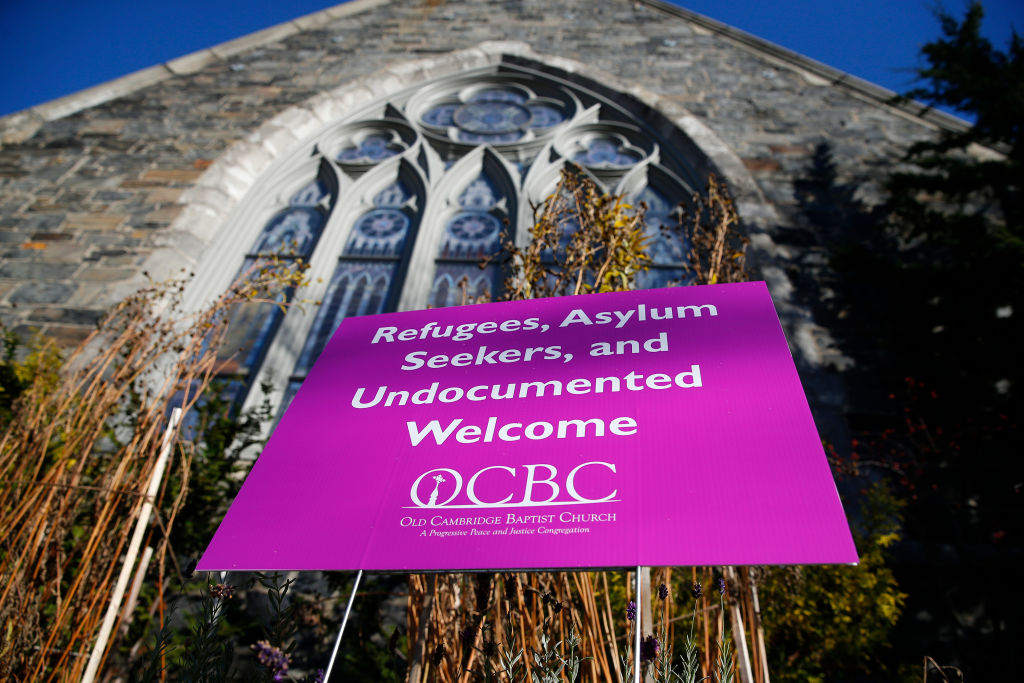Jody Ray’s pastoral ministry to refugees and immigrants sometimes puts him at odds with members of his conservative community in Jacksonville, Florida. But so far, he’s not found himself at odds with the law.
A new immigration bill under consideration in the Sunshine State would change that and is generating pushback from some evangelicals in the process.
Senate Bill 1718 cracks down on businesses relying on illegal labor, requires hospitals to ask about patients’ citizenship status, and invalidates out-of-state driver’s licenses issued to illegal immigrants among other actions.
But it’s the sweeping bill’s transportation provision that Ray and a group of church leaders say has troubling religious liberty implications. It would make it a crime for anyone to transport illegal immigrants in the state for any reason. At a press conference hosted by the refugee organization World Relief and the Evangelical Immigration Table last week, the coalition said that the changes would prevent religious groups from following their faith in ministering to groups in need.
“Without a clarifying phrase, Senate Bill 1718 could very reasonably be interpreted to mean it could be illegal to drive an elderly neighbor to church,” Dale Schaeffer, a district superintendent with the Church of the Nazarene in Florida, said on the press call. “It could be a felony for a youth pastor to pick up a teenager in a church van.” Or school bus drivers taking students to church-affiliated schools.
“Religious liberties are at stake for literally tens of thousands of Christians across the state of Florida,” he said.
The bill makes it a third-degree felony—punishable by up to five years in prison—to transport “into or within this state an individual whom the person knows, or reasonably should know, has illegally entered the United States.” Each undocumented person would count as one offense. Five or more offenses at one time amounts to a second-degree felony, punishable by up to a 15-year prison sentence.
The measure’s intent is to target human smuggling in Florida, which is home to an estimated 772,000 undocumented immigrants, according to the Migration Policy Institute. But critics say it’s too broad. “It’s like a rocket launcher when you needed a fly swatter,” Aaron Reichlin-Melnick, policy director at the American Immigration Council and a former immigration lawyer, told The Dispatch. “And it raises enormous chilling effect concerns for the average Floridian who might have a friend or acquaintance or loved one or family member who is undocumented.”
Federal law addresses the same issue but with a key difference. The federal Immigration and Nationality Act makes transporting someone in the country illegally a crime when the transportation is “in furtherance of such violation of law,” typically interpreted to mean assisting someone in evading immigration laws.
“That clause is crucial,” Reichlin-Melnick said. “It’s not a federal crime to simply drive an undocumented immigrant from one place to another. You have to transport them in furtherance of their violation of immigration law.”
Typically, he added, federal courts have interpreted the statute to “target behavior like smuggling” or labor trafficking. The person doing the transporting also has to be in “knowing or in reckless disregard of the fact that an alien has come to, entered, or remains in the United States in violation of the law.”
For now the controversial provision in the Florida law seems to have the backing of GOP Gov. Ron DeSantis. If he indeed mounts a presidential run later this year, he’ll likely try to court evangelical voters—some of whom are voicing the loudest opposition to the Florida bill.
DeSantis has made cracking down on immigration a key policy priority in Florida. In February, he announced his proposal to address “the increasing threats posed by illegal immigration as a result of the Biden administration’s failure to secure our nation’s borders.” His package included stiffening penalties against human smuggling including to “knowingly transport, conceal, or harbor illegal aliens.”
His allies in the statehouse have been quick to introduce legislation to codify DeSantis’ immigration priorities. The first day of Florida’s legislative session, GOP Sen. Blaise Ingoglia introduced SB 1718.
“I wholeheartedly thank and commend Gov. Ron DeSantis for having the courage to lead on this issue, when the federal government is failing our citizens, our families and our communities. This problem is now at our doorstep and Florida will not stand for it anymore,” he said.
In mid-March, the Senate Rules Committee approved the bill along party lines and referred it to another committee. The House of Representatives is also considering a similar bill, but the relevant committees have not yet held hearings or advanced the legislation. The legislature’s session adjourns on May 5.
It’s unclear whether what passes will be as sweeping as the legislation’s current form, but it seems likely that whatever clears the Florida Legislature will meet the flourish of DeSantis’ pen. If it’s passed, the law would take effect on July 1.
“Since this legislation is still subject to the legislative process (and therefore different iterations), the governor will decide on the merits of the bill in final form if and when it passes and is delivered to the governor’s office,” DeSantis deputy press secretary Jeremy Redfern told The Dispatch.
Gabriel Salguero, who heads the National Latino Evangelical Coalition and pastors an Orlando-based Assemblies of God church, said he has reached out to DeSantis’ office to voice concerns, to no effect.
Lawmakers are “making an error, morally and strategically,” he said. “Especially when they go so far as to criminalize basic elements of church ministry.”
Ray, the Jacksonville missions pastor, said he has no plans to change his approach to ministry should the law pass: “As followers of Christ, we are living out our faith most clearly when we answer the call to care for those in need: widows, orphans, immigrants and the poor.”









Please note that we at The Dispatch hold ourselves, our work, and our commenters to a higher standard than other places on the internet. We welcome comments that foster genuine debate or discussion—including comments critical of us or our work—but responses that include ad hominem attacks on fellow Dispatch members or are intended to stoke fear and anger may be moderated.